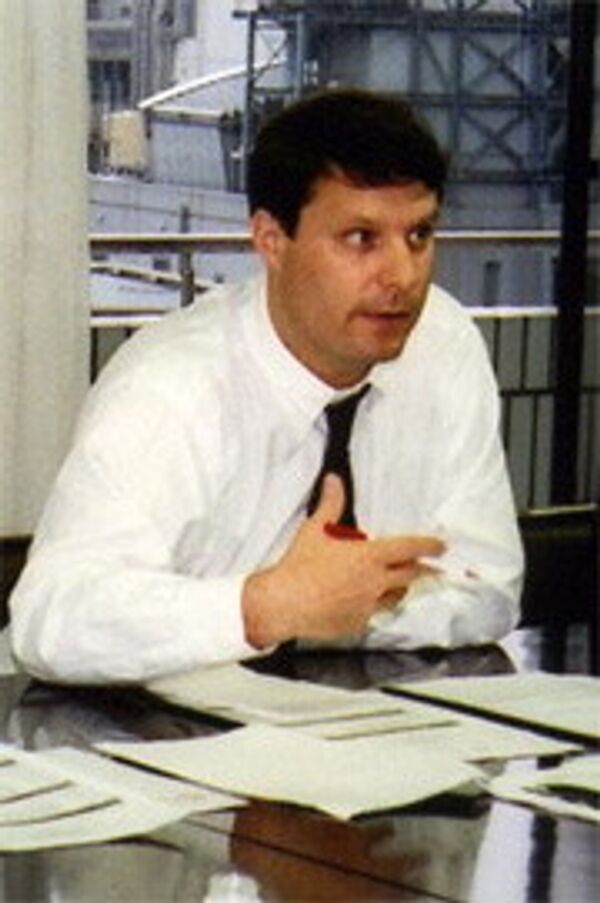Could the two imprisoned American journalists become pawns in a political game of Pyongyang? What steps should we expect from Washington? RIA Novosti sought the opinion of Dr. James L. Schoff, Associate Director of Asia-Pacific Studies at The Institute for Foreign Policy Analysis.
Do you think that the verdict carried out in North Korea was purely political one? Now Pyongyang has an excellent bargain, I would say, in relations with the United States.
I suppose that’s one interpretation and obviously we don’t know exactly what the motivations are in each particular case. Certainly all of the steps that North Korea has taken in the last six or eight months or so have pointed in the direction, where they are interested in keeping people out: whether it’s relationships with South Korea, weapons inspectors, or food, aid deliverers, etc.
I think, as much as it’s useful in a future negotiation with the United States, the primary motivation is to send the very clear message: “we are not weak, and we are not vulnerable and no one should be poking around our borders, and if you do, you will pay a very stiff penalty”. So, I think, they do it almost as a deterrent. Unfortunately, that means the journalists could spend some time in prison or in labor camps, maybe not years, hopefully I am wrong, but I wouldn’t expect them to turn around and give them up, because that may look like the penalty is not that strong, if someone decides to be poking around their country.
In a parallel development the other day Secretary of State Hillary Clinton said that US is quite serious about putting North Korea back on the list of the countries sponsoring terrorism. Was it just a “political” warning or is it really possible?
I think, her comment was saying that they were considering it, or there was something they were looking at. To some extent I think they were responding to a political pressure in Congress and suggesting that: “Okay, we’ll take a look at this”. It is not really something, I think, that the government wants to do, because there is no clear mechanism for doing it.
The list is not supposed to be there just to sanction countries we do not like or agree with, it is supposed to be in response to clear evidence of support for terrorist activities or carrying out terrorist activities. Politically it is hard to explain that in sound bites, so they say we will consider it and look into it. But in the meantime they will be coming out with other sanctions, whether it’s financial or other efforts to implement certain UN resolutions and proliferation – counter-proliferation. So, they will be able to demonstrate that they are taking a strong stand against North Korea pretty soon.
I guess, I would be surprised if the terrorism list comes back later on as an issue. Unless there is some evidence that North Korea supporting something specifically, they will use other means to try to pressure North Korea.
Do you think it will help? Because there were so many resolutions passed, so many sanctions imposed and nothing, practically, nothing has changed. And some experts say that tough sanctions may push North Korea to desperate, unpredictable moves.
No, there is certainly no good track record of success in this regard. There was decent amount of optimism in the United States that this time around China and also perhaps Russia were more upset than they had been in the past and were willing to kind of sign on to give us approach that was going to be tougher and really enforce some of the sanctions that has been on the books. That optimism seems to be fading a little bit, I think.
Certainly Russia and China are not pleased with North Korea’s activities and they are trying to coax North Korea to change its mind about certain things, but their approach is much more patient approach, and uses other avenues not just pressures as the best way to go. So we have a fundamental disagreement kind in terms of what we think is the best way to move forward. So, we will have some unity amongst the other six-party countries and in the UN demonstrating displeasure and applying further nominal sanctions on North Korea. But I agree with you. I don’t expect anything to change that much.
The U.S., and South Korea and Japan may come up with some other extra sanctions of their own that they can’t quite get China to back on financial sanctions, etc. That may have some impact, but I think the Obama’s administration understand that we are going into more of a containment mode. It may be that North Korea will turn, will pivot back and want to talk bilaterally with the U.S. about arms control and other [issues], kind of change the nature of the discussion away from the six-party talks, and we’ll be willing to talk to them.
But we are going to have to be very clear about long term, the ultimate goal, and Secretary [of Defense Robert] Gates said at Shangri La in Singapore, that was U.S. policy approved at the highest level, which is its denuclearization. And we will support our allies in the region and you know nothing has really changed. So, if North Korea is trying to completely change the nature of the dialogue, there is not that much to talk about in the near term. So we will just have to try to contain North Korea’s behavior as opposed to punish it or coax it to a negotiation.
Interview by Samir Shakhbaz
North Korea wants no one near its borders

Subscribe
Could the two imprisoned American journalists become pawns in a political game of Pyongyang? What steps should we expect from Washington? RIA Novosti sought the opinion of Dr. James L. Schoff, Associate Director of Asia-Pacific Studies at The Institute for Foreign Policy Analysis.

